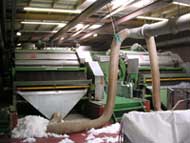SALES DIVISION
We provide many different
raw materials to the spinning & weaving, non-woven, filling and saddle
industries, as well as raw materials for the plastics industry.
We have though in the past few years specialised in technical
synthetic fibres, particularly para and meta-aramid, dehaired cashmere, stock
yarns for the weaving trade and fillings for the saddle industry.
At the beginning of 2000 we opened an office in Germany for
purchasing, sales and advice on processing.
HISTORY
The Company was
originally established in 1895 by Francis Henry Davy as The Bradford
Waste Pulling Co Ltd on the same site that it occupies today and was
engaged in the processing of mohair and alpaca laps for recombing. It
was also one of a number of companies in the Bradford area offering
garnetteing on a commission basis. Shortly before the first world war,
the plant was extended to include the processing of wool worsted
spinning threadwastes providing a raw material for the woollen spinning
and felt industries. In 1919 Francis's son Walter joined him in the
Company following his service in the Royal Navy and over the next few
years the Company gradually developed into one of the major textile
waste processing plants in Europe.
The third decade of the twentieth century saw the introduction of
condensor spinning and for the next 25-30 years yarns were produced
using rami noils from the Yangtze River Basin and pure silk noils from
various sources in the far east. This in turn lead to the establishment
of a silk processing plant in Bradford. The yarns were used for ladies
dress goods manufacturing in Ireland and France. During the war years,
silk yarns were used for shot bags for the munitions industry. The post
war years saw huge quantities of alpaca and camelhair fleece being
prepared for the woollen spinning industry.
In 1949 Walter's eldest son Keith joined the Company after serving
in the Royal Navy and 3 years at University of Leeds. He was followed in
1959 by the youngest son, Roger who's involvement mainly concentrated in
the running of the mill. Walter continued to work until an accident at
work in 1963 after which he took a lesser part in the general running of
the mill. Roger carried on in the running of the mill until 1991 when he
retired.
In 1963, Keith Davy started the merchenting business, Keith
Davy(Crantock)Limited, which to avoid conflict with the Bradford Waste
Pulling Co's commission customers dealt entirely with synthetic staple
fibres and wastes. In 1978, Andrew, eldest son of Keith joined the
business after studying at the University of Leeds and a year spent
working in Japan. During the 1980s export markets were targeted and a
move was made away from wool wastes into technical fibres and the
dehairing of cashmere. A need was recognised to have people on the
ground in various countries and therefore offices were opened in Germany
and the United States of America. Also close contacts were established
in China, which culminated in the opening of the joint venture factory
which, initially concentrated in the dehairing of cashmere but has since
expanded its operations to include the sorting of various textile wastes
and opening and garnetting of materials for the Far East, European and
American markets. As the costs of production in Europe have increased,
it has been necessary to move machinery from Bradford to China to ensure
continuity of this business.
In the early 1980s Mark Davy, Andrew's younger brother joined the
Company having had experience in the textile engineering industry. In
January 1997 Stephen Howard joined the Company to technically upgrade
the mill and advance the cashmere business.
PROCESSING DIVISION
This
division is a purely commission processor of textile raw
materials and by-products.
-
Technical Synthetic Fibres such as para and meta-aramid, PPS,
Preox etc.
-
Speciality Natural Fibres
- Mill
Wastes
We have
facilities for the following processes.
-
Sorting
-
Precision
Cutting
-
Random
Cutting
-
Opening &
Pulling
-
Scouring
-
Garnetting
-
Carding
and Sliverin
|

Carding of
Synthetic Fibre |
Originally
the company recycled primarily wool threads in many forms, but over
the years this has expanded to a very wide range of both natural and
synthetic fibres. We still process traditional textile wastes,
particularly carpet threads for spinners.
The whole gamut of speciality natural fibres are processed. We are
able to scour and card cashmere, camelhair, goathair and alpaca.
Card & precision cut silk and garnet all types of threadwaste. The
recent introduction of new revolutionary machinery also means that
we are now able to make it economical to recover cashmere fine hair
from the coarse hair discarded by cashmere dehairing companies.
As synthetic fibres started to be used in the textile industry, we
moved with the times, installing new machinery or adapting old. We
are now able to process both the standard synthetic fibres and all
technical fibres such as para & meta-aramid, carbon, preox, PPS etc.
The company now has a customer base spread throughout the world.
Many merchants, spinners and non-woven companies send their waste
products for recycling and return.
|
|